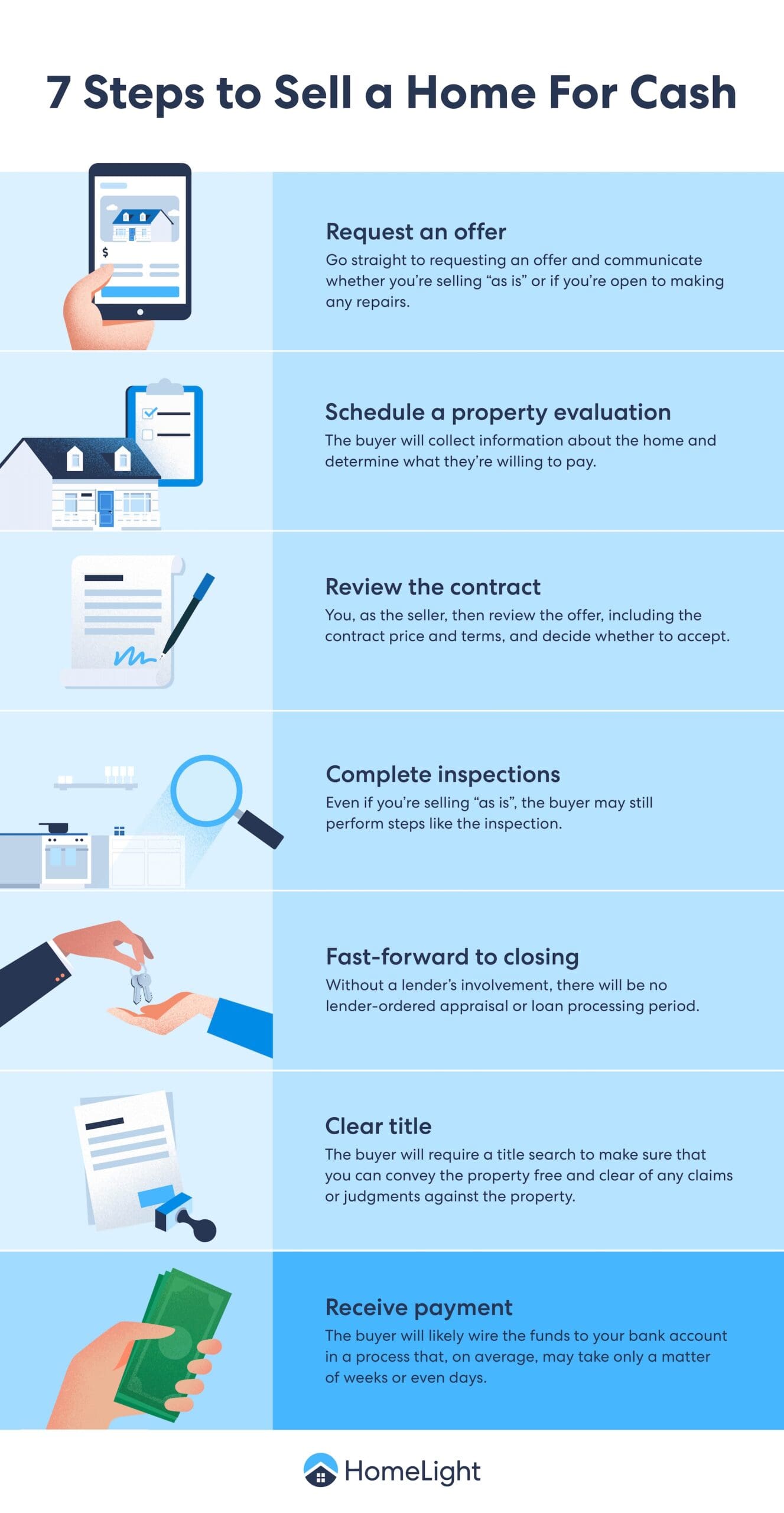Wait! Read This Before You Sell Your House for Cash
- Published on
- 15 min read
-
 Julie Guthmann, Contributing AuthorClose
Julie Guthmann, Contributing AuthorClose Julie Guthmann Contributing Author
Julie Guthmann Contributing AuthorJulie Guthmann is an experienced writer and editor living in New Jersey. Her diverse background includes real estate, travel, healthcare, and other industries.
-
 Sam Dadofalza, Associate EditorClose
Sam Dadofalza, Associate EditorClose Sam Dadofalza Associate Editor
Sam Dadofalza Associate EditorSam Dadofalza is an associate editor at HomeLight, where she crafts insightful stories to guide homebuyers and sellers through the intricacies of real estate transactions. She has previously contributed to digital marketing firms and online business publications, honing her skills in creating engaging and informative content.
Selling your house can be a daunting and time-consuming process, especially if you’re looking for a quick and low-hassle experience. A death in the family, divorce, or mounting debt often adds extra strain. Nonetheless, it’s possible to experience a fast, hassle-free transaction, especially when you choose to sell house for cash and partner with investors or flippers.
“You make a phone call or answer some questions online, agree to an offer, and then it’s not something you have to worry about anymore,” says Doug Van Soest, owner of SoCal Home Buyers, a house flipping company in Southern California. “Plus, you’ll save money on things like commissions, repairs, and closing costs.”
Although it’s a convenient option, selling a house for cash also usually means leaving some extra money on the table. So, is selling your house for cash a good idea?
Here, we’ll take a closer look at what it means to sell your house for cash, how to weigh its pros and cons, where to request a cash offer, and ultimately, how to do it.
What does it mean to sell a house for cash?
When you sell a house for cash, it simply means you’re selling to a buyer who can purchase the home outright without the use of a mortgage loan. If you agree to an offer of $350,000, your cash buyer will need to show proof that they have that $350,000 at the ready in a bank account or its equivalent.
This requires collaborating with a specialized type of buyer who often invests in off-market properties — homes that are in poor condition, requiring extensive repairs, or are otherwise available at a discounted price.
The proportion of cash buyers in the housing market is significant, according to the National Association of Realtors® (NAR). In May 2025, 27% of home sales were made with cash. This strong cash presence is attributed to many buyers leveraging equity from previous home sales to avoid higher mortgage rates.
Even still, NAR reports that 74% of recent buyers financed their home purchase. So, attracting a buyer who is willing and able to pay all cash remains a relatively uncommon occurrence.
To ensure a cash offer for your home, you’ll need to work with a house-buying company or individual investor with cash reserves.
After completing a few steps to evaluate the home and make a firm offer, the buyer will either write a check or wire the money via a secure electronic transfer for the full amount of their offer price at closing.
Cash investors typically pay 50% to 70% of market value, while iBuyer companies might pay 85% to 95%, depending on the home and the local market.
Reasons to sell a property for cash
Now that you know what it means to get cash for your home, is selling your house for cash a good idea?
“The value a cash buyer offers is convenience and speed,” says Will Holly, owner of Holly Nance Group, a boutique real estate investment firm in New Jersey. “You’ll avoid the time hurdle involved with back-and-forth negotiations with multiple buyers.”
“With cash, it turns into an easy transaction where the seller doesn’t have to be stressed out. It just takes all that pressure off the seller,” adds Mark Abdel, a top-performing real estate agent in Minneapolis who sells properties 66% faster than the average agent in his market.
Let’s review some of these benefits more in-depth:
1. Faster closing
When you sell a house for cash, you can get money for your home much faster, usually in a week or two, compared to a month and a half with a non-cash buyer.
Mortgages are time-consuming, taking an average of 42 days to complete from start to close, as of July 2025. The lender will also require an appraisal to confirm the amount of funds they’re willing to provide, which can introduce additional delays.
All in all, with a cash offer from a house-buying company, you can often close the sale in as few as seven to ten days. This is a huge advantage for sellers who need cash quickly.
2. No repairs or home staging
According to a recent survey, about 56% of home buyers prefer a move-in-ready home that doesn’t require additional repairs or renovations. If your house needs work, it can be more challenging to find a traditional buyer.
When you sell your home for cash to a house-buying company, you can skip the repairs and other preparations typically required when selling on the open market.
Cash-for-homes companies often purchase homes as-is since they have the capital and expertise to update a house. This removes the repair burden from the seller’s shoulders.
A cash sale also means you won’t need to stage your home, worry about keeping it spotless for weeks, or disrupt your schedule for repeated showings.
3. Reduced closing fees
In addition to clearing away repair and staging expenses, a cash offer can eliminate extra closing costs. Many home-buying companies cover these costs entirely for the seller, which can total about 9% to 10% of the sale price.
The most significant expense is typically the agent commission, which averages 3% to 6% of the sale price.
These savings can offset a lower offer price. It’s crucial to consider all fees and expenses when deciding whether to sell your house for cash.
4. Smaller holding costs
So long as you own a house, you’re responsible for its holding costs (also known as carrying costs), which include utilities, taxes, insurance, maintenance, and other fees that amount to a decent chunk of change each month.
In a sluggish real estate market, Holly says it could take as long as six months to sell a house. This can cause delays of up to half a year to get the equity out of a home while the owner continues to cover the costs of heating, cooling, mowing the lawn, etc.
A cash offer provides more immediate relief from these ongoing costs. Plus, the longer your home sits on the market, the greater the likelihood of reducing the list price.
5. Peace of mind
Holly also points out the peace of mind and financial certainty that comes with a cash sale, especially for homeowners juggling life challenges. “Any home seller with any complexity to the sale is better off with a cash buyer,” he says.
Those complexities might include a death in the family, bills stacking up, or expensive repairs.
A cash offer may come in lower, but it won’t hinge on your home appraising at a certain amount or the financing working out for your buyer. When you need cash now, a drawn-out sale can be a major stressor.
6. Interest rate immunity
As home shoppers face today’s higher interest rates, a buyer with cash in hand eliminates the uncertainty of getting a loan approved. Mortgage rates are expected to dip slightly, but they still currently hover around the upper end of 6%, making it challenging for some prospective buyers to qualify for a home loan.
“A cash buyer is not susceptible to rate hikes,” Holly says. An increase in interest rates or a change in the buyer’s credit history or employment situation could cancel or delay a settlement just days before closing. “Contracts are falling out more often,” adds Holly about the current real estate market.
Without the added risk of a financing contingency, selling to a cash buyer is typically a simple, more certain process.
7. Flexibility
Whether you want to move next week or stay put for a couple of months, a cash sale generally gives you plenty of wiggle room. Sellers who work with a house-buying company often select a move-out date that works best for them.
What’s the process of selling a house for cash?
Selling a home for cash skips many of the traditional steps, making the process faster and more straightforward. There’s no need for mortgage approvals, appraisals, or extensive repairs.
Here’s a simple breakdown of how a typical cash sale works.
Step 1: Request an offer. Go straight to requesting an offer and communicate whether you’re selling “as is” or if you’re open to making any repairs.
Step 2: Schedule a property evaluation. The buyer will collect information about the home and determine what they’re willing to pay.
Step 3: Review the contract. You, as the seller, then review the offer, including the contract price and terms, and decide whether to accept.
Step 4: Complete inspections. Even if you’re selling “as is”, the buyer may still perform steps like the inspection.
Step 5: Fast-forward to closing. Without a lender’s involvement, there will be no lender-ordered appraisal or loan processing period.
Step 6: Clear title. The buyer will require a title search to make sure that you can convey the property free and clear of any claims or judgments against the property.
Step 7: Receive payment. The buyer will likely wire the funds to your bank account in a process that, on average, may take only a matter of weeks or even days.

When selling your home, one of the biggest decisions is whether to go the traditional route or accept a cash offer. Each option has its own pros and cons, depending on your priorities, speed, convenience, or the potential for higher profit.
Here’s how a cash home sale compares to a traditional one.
Cash home sales vs. traditional home sales
| Aspect of the sale | Selling the house to a cash buyer | Listing with a real estate agent |
| Timeline | In as little as 7 days or up to 30 days if the seller needs more time. | 69 days (27 days to get an offer, and another 42 days to close, on average). |
| Home prep and repairs | None. You skip the preparations, repairs, and staging. | Make necessary repairs, deep clean, declutter, landscape, and stage the home. |
| Showings | There are typically no showings, though a cash buyer will collect information about the home and may request photos or videos. | You’ll make your home available for 10 to 25 showings, on average. |
| Inspections | Even if you’re selling as-is, a home inspection may still be required. | You may need to make repairs for the buyer or renegotiate the price. |
| Appraisal | House-buying companies and investors may or may not perform a traditional appraisal, depending on the onsite visit and the company’s evaluation process. | When your buyer secures a mortgage, an independent appraisal will be required to close. This process can take 6 to 20 days and may require negotiations. |
| Title search | The cash buyer will require a title search to make sure that you can convey the property free and clear of any claims or judgments against the home. | Title issues must be resolved to close the sale. The property must be clear of claims, such as mechanic’s liens, unpaid taxes, or boundary encroachments. |
| Financing contingency | None are present in a cash sale. | Mortgaged buyers often use a financing contingency that could hold up the deal if the loan doesn’t clear. |
| Closing costs | Many cash-for-homes companies will pay the closing costs. | About 1% to 3% of the sale price (on top of the agent’s commission), including title insurance, escrow fees, and taxes. |
| Getting paid | The cash buyer may wire funds to your bank account in weeks or even days. | The time it takes for you to receive funds will depend on the buyer’s due diligence period and other steps you must clear before settlement, as required by the buyer’s lender. On average, it takes 42 days to close a traditional home sale. |
Who buys houses for cash?
Cash buyers or house-buying companies are individuals or entities that buy your house outright and usually in as-is condition, without the need for lender financing. In general, selling your home to a cash buyer allows you to skip the home prep, showings, and staging hassles and arrange a more flexible closing timeline to coordinate with the purchase of your next residence.
However, not all cash buyers have the same business model. It’s a good idea to know who you’re contacting to request a cash offer for your home. To keep it simple, we’ve grouped these buyers into a few broader categories you’re likely to encounter.
Investors
Investors purchase homes to build wealth. Some flip homes for a profit, while others keep them for rental income. They typically pay cash for their purchases.
Buy-and-hold cash buyers purchase homes and convert them into rental properties. They may sell a property once it appreciates enough or keep it indefinitely.
This category includes individual investors who buy and rent out properties for passive income and larger institutional investors. When you sell to a buy-and-hold investor, you have more flexible closing dates and will likely get a better price than if you were to sell to a house flipper.
Media darlings Chip and Joanna Gaines or your remodeling-enthusiast uncle often come to mind when you see the phrase “house flippers.” Whether a small mom-and-pop operation or a larger business, flippers buy homes, often in poorer condition and at a lower price, with the intention of renovating them and reselling them for more.
Home flippers remain a strong force in the cash house-buying marketplace. In the first quarter of 2025, 67,394 single-family homes and condos were flipped, making up 8.3% of all home sales between January and March.
We Buy Houses and large scale house-buyers
Large-scale house buyers specialize in purchasing homes quickly for cash, often in as-is condition. These companies offer a hassle-free sale with no repairs needed. Sellers typically start by submitting property details online or calling for an offer. While the process is fast and convenient, offers are generally below market value.
You’ve probably seen ads for companies saying, “We Buy Houses for Cash.” These companies fall into the house flippers category listed abov, but are worthy of their own category because of their growing prominence in the industry.
The largest house-buying franchise in the country is HomeVestors of America, which operates under the name “We Buy Ugly Houses®” and specializes in flipping dilapidated homes.
It’s easy to confuse We Buy Ugly Houses with other companies that have similar names touting their cash house-buying capabilities, such as We Buy Houses, another large, legit house-buying group. But keep in mind that “We Buy Houses” is not a trademarked term.
Many companies — big and small — use this phrase in their business name. Don’t assume “We Buy Houses” to be an indicator of a company’s legitimacy.
iBuyers
An iBuyer or instant buyer is a specific type of house-buying company that first emerged in the mid-2010s. iBuyers use automated valuation models (AVMs) to make competitive offers on homes that are typically in better condition. Examples include Opendoor and Offerpad.
While iBuyers generally pay more for homes than flippers or buy-and-hold investors, they charge a service fee of about 5%. Since they tend to make less profit per flip, they rely more on turning over a high volume of homes using technology to streamline operations.
An iBuyer or instant buyer is a specific type of house-buying company that first emerged in the mid-2010s. They use automated valuation models (AVMs) to make competitive offers on homes that are typically in better condition. Examples include Opendoor and Offerpad.
While iBuyers generally pay more for homes than flippers or buy-and-hold investors, they charge a service fee of about 5% of the home’s sale price. Since they tend to make less profit per flip, they rely more on turning over a high volume of homes using technology to streamline operations.
Founded in 2015, Offerpad is one of the largest iBuyers by transaction volume, along with Opendoor. Sellers can get started with the sale transaction by providing information about their property by filling out a questionnaire.
After checking the home’s condition, the company presents a competitive offer within 24 hours, which you can accept or decline. If you’re moving locally (within 50 miles), Offerpad will pay a professional moving company to haul your furniture and belongings to your new home.
How to find reputable cash buyers
One of the most convenient ways to find a reputable cash homebuyer is through a trusted platform like HomeLight’s Simple Sale. This solution provides you with a no-obligation all-cash offer sourced from one of the largest networks of cash buyers in the country. Our partner investors have a wide range of investment strategies, including fix-and-flip and buy-and-hold.
To get started, tell us a few details about your home and when you need to sell. After collecting some information, we’ll provide you with a no-obligation, full cash offer in as little as 24 hours, and you can close in as few as 7 days.
What are the downsides of selling for cash?
If what you’ve read so far has sold you on the idea of selling for cash, great. But it’s important to also understand the main drawback: the price you get from a cash buyer may be appreciably lower than what you’d get on the market.
House-buying companies typically pay less for your home to account for the money they’ll spend on repairs. They will perform a walkthrough of the property to see how much work it needs, which helps determine the amount they are willing to pay.
“The minimum return on investment varies, depending on things like the market and the condition of the home, but typically we need at least a 10% return on a purchase to make it worth the risk,” Van Soest says.
When flipping a house, “everything has to look brand new after repairs,” Holly says. Sometimes, this involves gutting the entire house, while other times, it’s just a cosmetic makeover. Turnaround time is typically about four months from the time he buys a home, makes renovations, and then sells it.
Depending on your situation, the lower offer price may not be a significant concern, or it could sway you toward a traditional listing. If you sell on the open market, you might leverage a better price as traditional buyers envision themselves living in your home. With cash buyers, there are generally no heartstrings to tug on — it’s strictly business.
Selling your home for cash might be quick, but it often means walking away with less money. Before you rush into an offer, it’s important to weigh what you might be giving up. Read our full guide on the pros and cons of selling for cash to make the smartest decision.
Whether you sell to a cash buyer or choose a traditional home sale, it’s best to know your home’s value so you can evaluate offers wisely. Get a preliminary estimate of how much your home might be worth today with HomeLight’s Home Value Estimator.
Answer a few questions about the home you’d like to sell, and we’ll use local housing market data to give you a ballpark value estimate in less than two minutes. A top real estate agent can also be a helpful resource in making your decision.
How much do cash home buyers pay?
Various house-buying companies and investors will offer different amounts for a home. Depending on the condition, price point, and location, your house will be more desirable to certain cash buyers than others.
Most investors have a specific “buy box” they use with parameters as to which types of properties are most valuable to them. That means what your home is worth will vary, even among buyers who can pay instantly.
Flippers often use the 70% rule. According to this guideline, a flipper won’t pay more than 70% of the “after-repair value” (ARV) of a home, which accounts for deductions to make repairs and renovations.
iBuyers tend to pay closer to market value because they target newer homes in good condition. But they charge a service fee, about 5% of the sale price.
In addition, you’ll likely have to pay closing costs of between 1% and 2% for escrow fees, title fees, and transfer taxes. After you accept the iBuyer’s offer, the company then inspects the home and subtracts the estimated cost of repairs from the final price.
Buy-and-hold investors fall somewhere between flippers and iBuyers. They typically pay more than flippers but less than iBuyers and aim to make between 8% and 12% on their investment when they sell or 4% to 10% from rental income while they hold.
“The discounted price someone should expect for a cash sale varies significantly,” Van Soest says. “The cleaner the house, the better the neighborhood, and the fewer issues a house has, the more likely you’ll get an offer that’s closer to market value. The more problems the buyer has to deal with, the lower the offer will be.”
Are cash-for-homes companies legit?
The short answer is yes. There are many legitimate companies out there that purchase homes for cash, provide you with a great experience, and are good on their word. However, we always recommend that you do your due diligence on any buyer before you provide sensitive information or sign a contract.
“Check that the house-buying company has a good track record of homes purchased,” Holly advises. He suggests looking at properties that the firm bought and sold in your neighborhood and examining public records to review its transaction history.
In addition, request references from other home sellers who have sold to the investor or house-buying company. Call them to ask about their experiences.
Abdel cautions sellers to be wary of scams where house-buying companies promise a certain price but then hit you with hidden fees that substantially slash your profit. Other steps to help ensure a company is legitimate include:
- Check their Better Business Bureau (BBB) rating: No matter what type of house-buying company you decide to work with, make sure it’s an accredited BBB member. Check for positive reviews and timely responses to complaints. HomeLight, which provides a cash offer for homes through our Simple Sale platform, has been BBB accredited since 2019 and currently maintains an A+ rating.
- Ask for proof of funds and adequate earnest money: “Ask for proof of funds such as a bank letter to make sure they have the money in their account,” Holly advises. An official proof of funds (POF) from the buyer’s bank verifies that they have adequate liquid assets to cover the purchase price and closing costs and provide sufficient earnest money, the deposit that represents a buyer’s commitment to a sale.
Should I still use a real estate agent?
An established real estate agent will likely have the inside track on who’s who in the local cash-buyer market and can also help you avoid getting lowballed.
“A lot of agents that are experienced and have been in the business have a Rolodex of people [who] they’ve worked with over time [and] are investors,” Abdel says, commenting on how top agents can help find cash buyers by pitching properties to their networks.
“There are a lot of investors reaching out directly to homeowners to try and buy their property with cash,” notes Brian Breeckner, a top-selling real estate agent based in Columbus, Ohio, who has helped investors build their portfolios.
“To make sure a buyer is legitimate, or that they’re making a good offer based on the value of your home, you can always speak to an experienced local real estate agent and get their opinion,” he advises.
HomeLight can connect you to top-performing agents in your area who sell homes faster and for more money. We analyze more than 27 million transactions and thousands of reviews to determine which agents will best meet your needs.
Whether you’re seeking a quick cash sale or aiming to reach more buyers by listing your home on the market, you’ll receive your agent recommendations in just two minutes.
How long does it take for a cash buyer to close?
Getting over that final hurdle to close a traditional sale — making sure a buyer’s financing is in order — can be an ordeal. With the time to close a purchase loan averaging 42 days in today’s market, that’s about a month and a half of waiting.
Cash buyers, on the other hand, are a lot more agile. Typically, a company that buys homes for cash will show you proof of funds for the amount they’re willing to offer and can close in as little as a week to 10 days.
FAQs on selling house for cash
Selling your house for cash can be a good idea, depending on your specific circumstances and needs. Some potential advantages include speeding up the sale process, avoiding the complexities of financing and appraisals, and receiving the full payment upfront without delays.
However, it’s important to carefully consider the offered price, research the reputation of cash buyers or companies, and evaluate your long-term financial goals before making a decision. Consulting with a real estate professional recommended by HomeLight can help you assess whether selling for cash aligns with your situation.
No, selling a house for cash is totally legal. It just means the buyer pays upfront without needing a mortgage loan. As long as everything is properly documented and follows local real estate laws, you’re good to go.
It’s easy to get a cash offer for your house using HomeLight’s Simple Sale platform, which provides cash offers nationwide on properties in almost any condition, even those that need work. Answer a few basic questions to tell us a little bit about your home.
Then, you can request a free, no-obligation offer from our extensive network of pre-approved investors across the country. If you choose to accept the offer, you can select your preferred move date and get paid in as little as 7 days.
You can start by reaching out to cash home-buying companies, investors, or marketplaces that connect sellers with cash buyers. Many companies let you submit property details online and get an offer within days. Just make sure to research the buyer and read reviews to avoid scams.
Consider using HomeLight’s Simple Sale platform to find reputable cash buyers in your area. HomeLight has built a nationwide network of hundreds of pre-approved real estate cash buyers and investors. We use your local neighborhood data and our extensive connections to find the best offer for your home. Plus, requesting an offer is completely free.
Cash buyers typically offer less than market value, usually around 70% to 90% of what you would get in a traditional sale. The trade-off is speed and convenience since you avoid repairs, staging, and waiting for buyers. If you need a fast, hassle-free sale, the lower offer might be worth it.
Stick with reputable companies or buyers who have verified reviews and a solid online presence. Be cautious of anyone who pressures you to rush, won’t meet in person, or asks for upfront fees.
It depends on your situation. Investors usually buy as-is and close fast, but their offers are often lower. Traditional cash buyers could offer more and may not require an appraisal, but they may arrange for inspections, which can extend the selling timeline.
If you’re looking for maximum profit, listing your home on the open market with a real estate agent is usually the best move. This way, multiple buyers can bid, potentially driving up the price. Selling for cash is faster, but you might get a lower offer compared to selling traditionally.
It’s not always required, but it’s a smart move. A lawyer can help you review the contract, ensure a smooth closing, and protect you from potential legal issues. If you’re selling on your own without a realtor, having legal guidance is even more important.
Technically, yes. You can sell your house for any amount you choose. However, if the price is significantly below market value, it could lead to tax implications, such as the gift tax, which is common among those selling to a family member at a discount. It’s always best to consult a professional before making such a low sale.
If speed, convenience, and certainty are your top priorities, then selling your house for cash can be the right choice for you. Abdel sums it up this way: “It’s an almost guaranteed sale where you go with the cash buyer, and you don’t have any contingencies.”
Without the risk of financing glitches delaying the sale or inspection issues prompting the buyer to renegotiate, selling your house to a cash buyer will get you to the closing table much faster and with fewer headaches. But unless you sell to a cash buyer who plans on living in the home, Abdel says you could be giving up 10% to 15%. However, the fast sale may be exactly what you need.
Should you sell your house for cash?
One thing is certain: Companies that buy homes for cash aren’t going anywhere. And they are becoming more popular with a variety of sellers, not just those in distress.
“In my opinion, iBuyers and other cash-buying companies will continue to become more mainstream,” Van Soest says. “Technology is making it easier and easier to sell a home virtually.” And, he adds, you may get a better price than you would expect if your house is in really good condition and a desirable area.
Still on the fence? HomeLight’s Simple Sale platform offers a commitment-free way to test the waters. We partner with one of the largest networks of cash buyers in the U.S. Just enter a few details about your home online, and we’ll provide you with a cash offer within 24 hours. You can close the sale in as few as 7 days — no additional fees, agent commission, or prep work.
Writer Dorothy O’Donnell contributed to this story.
Header Image Source: (Will Porada/ Unsplash)










